Offshoring and Outsourcing Impact on Sainsbury's Business Performance
VerifiedAdded on 2020/11/23
|27
|6740
|149
Project
AI Summary
This research project investigates the benefits and risks of offshoring and outsourcing on the business performance of Sainsbury's at a global level. The study begins with an overview of offshoring and outsourcing, defining the concepts and exploring their impact on businesses. The literature review examines the benefits and risks associated with these strategies, focusing on their effectiveness for Sainsbury's. The research methodology outlines the investigation type, research philosophy, approaches, and design, including data collection methods and ethical considerations. The analysis delves into the effectiveness of offshoring and outsourcing in reducing costs, improving quality, and enhancing business strategies. The project also examines ways Sainsbury's can mitigate the risks associated with offshoring and outsourcing. The conclusion and recommendations summarize the findings and provide suggestions for future improvements, offering insights into the strategic implications of global operations for Sainsbury's.
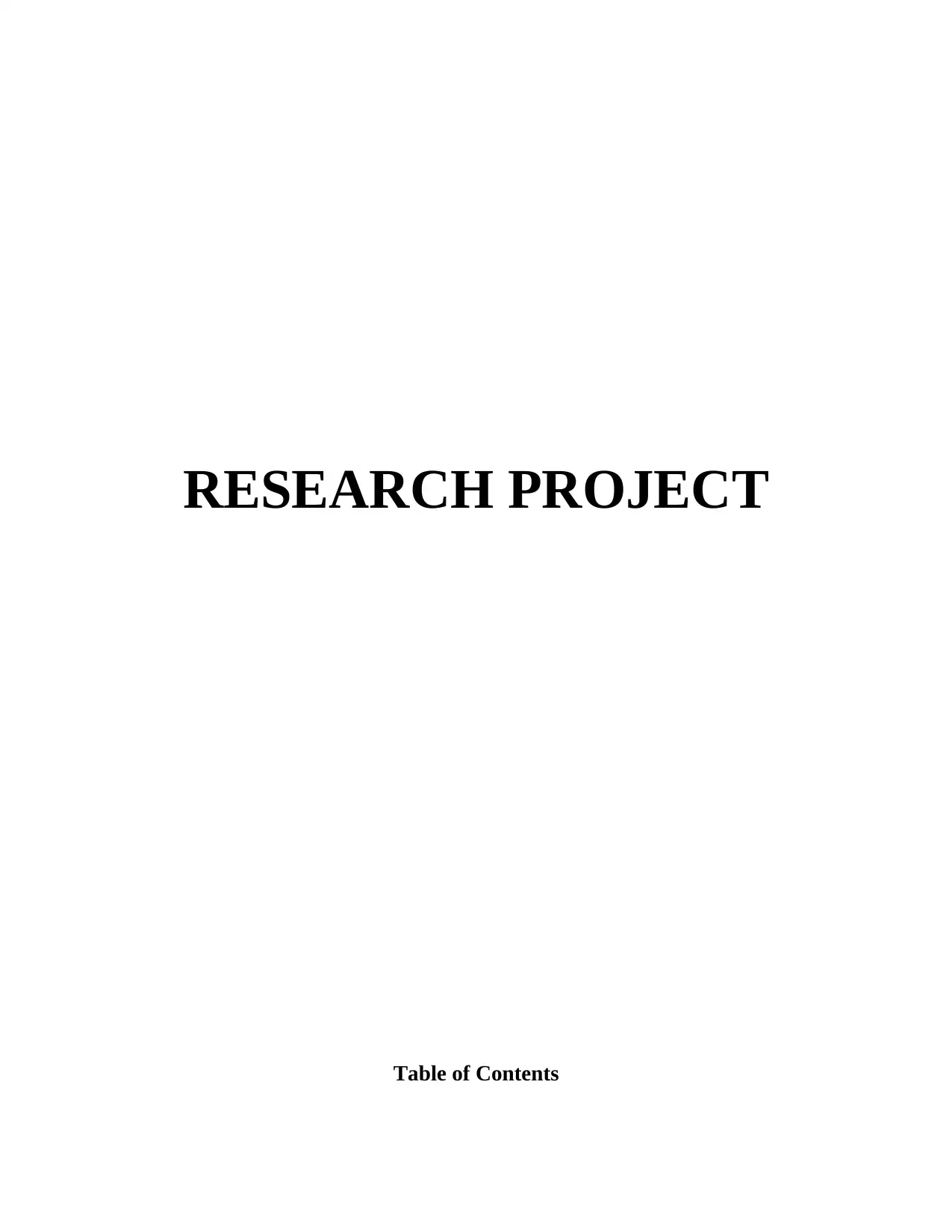
RESEARCH PROJECT
Table of Contents
Table of Contents
Paraphrase This Document
Need a fresh take? Get an instant paraphrase of this document with our AI Paraphraser
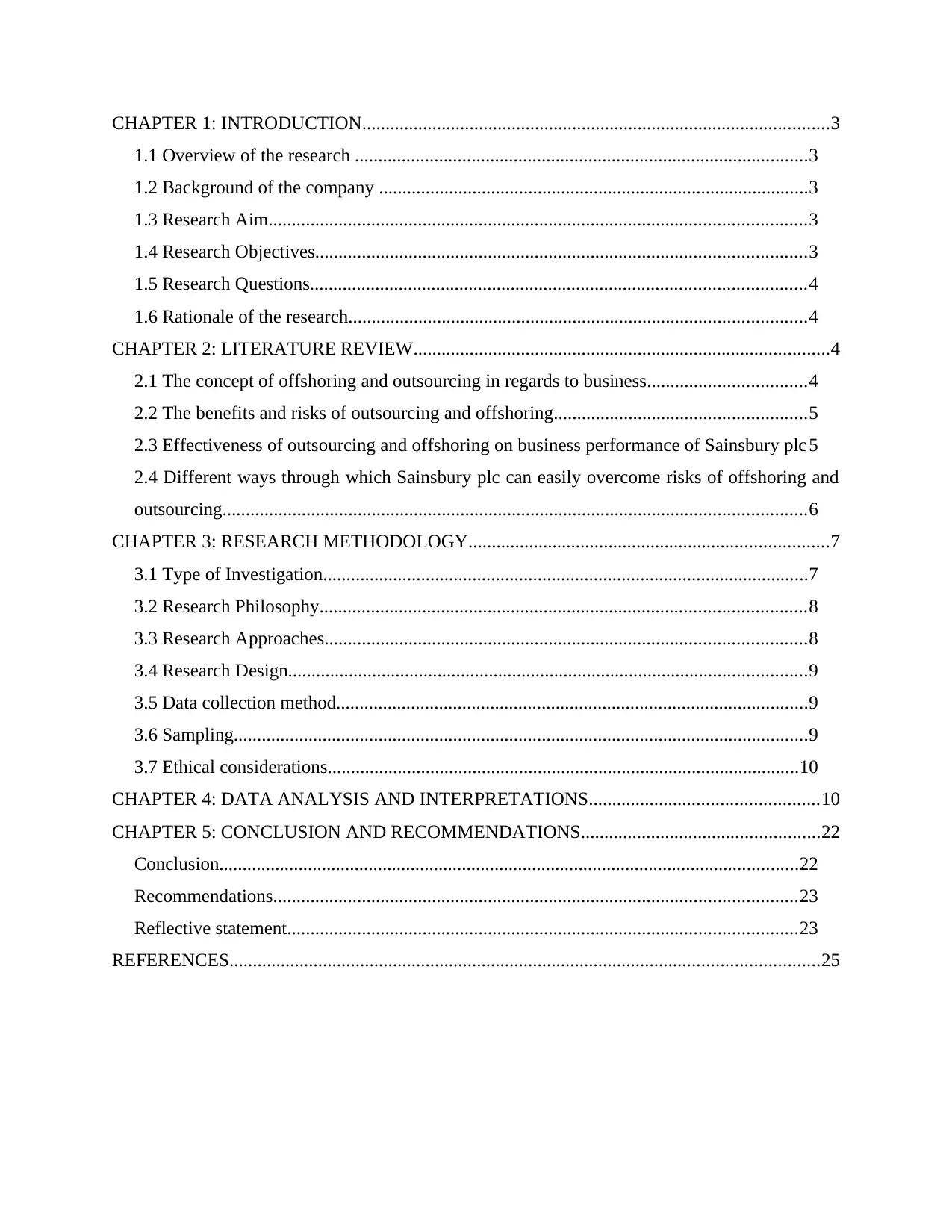
CHAPTER 1: INTRODUCTION....................................................................................................3
1.1 Overview of the research .................................................................................................3
1.2 Background of the company ............................................................................................3
1.3 Research Aim...................................................................................................................3
1.4 Research Objectives.........................................................................................................3
1.5 Research Questions..........................................................................................................4
1.6 Rationale of the research..................................................................................................4
CHAPTER 2: LITERATURE REVIEW.........................................................................................4
2.1 The concept of offshoring and outsourcing in regards to business..................................4
2.2 The benefits and risks of outsourcing and offshoring......................................................5
2.3 Effectiveness of outsourcing and offshoring on business performance of Sainsbury plc 5
2.4 Different ways through which Sainsbury plc can easily overcome risks of offshoring and
outsourcing.............................................................................................................................6
CHAPTER 3: RESEARCH METHODOLOGY.............................................................................7
3.1 Type of Investigation........................................................................................................7
3.2 Research Philosophy........................................................................................................8
3.3 Research Approaches.......................................................................................................8
3.4 Research Design...............................................................................................................9
3.5 Data collection method.....................................................................................................9
3.6 Sampling...........................................................................................................................9
3.7 Ethical considerations.....................................................................................................10
CHAPTER 4: DATA ANALYSIS AND INTERPRETATIONS.................................................10
CHAPTER 5: CONCLUSION AND RECOMMENDATIONS...................................................22
Conclusion............................................................................................................................22
Recommendations................................................................................................................23
Reflective statement.............................................................................................................23
REFERENCES..............................................................................................................................25
1.1 Overview of the research .................................................................................................3
1.2 Background of the company ............................................................................................3
1.3 Research Aim...................................................................................................................3
1.4 Research Objectives.........................................................................................................3
1.5 Research Questions..........................................................................................................4
1.6 Rationale of the research..................................................................................................4
CHAPTER 2: LITERATURE REVIEW.........................................................................................4
2.1 The concept of offshoring and outsourcing in regards to business..................................4
2.2 The benefits and risks of outsourcing and offshoring......................................................5
2.3 Effectiveness of outsourcing and offshoring on business performance of Sainsbury plc 5
2.4 Different ways through which Sainsbury plc can easily overcome risks of offshoring and
outsourcing.............................................................................................................................6
CHAPTER 3: RESEARCH METHODOLOGY.............................................................................7
3.1 Type of Investigation........................................................................................................7
3.2 Research Philosophy........................................................................................................8
3.3 Research Approaches.......................................................................................................8
3.4 Research Design...............................................................................................................9
3.5 Data collection method.....................................................................................................9
3.6 Sampling...........................................................................................................................9
3.7 Ethical considerations.....................................................................................................10
CHAPTER 4: DATA ANALYSIS AND INTERPRETATIONS.................................................10
CHAPTER 5: CONCLUSION AND RECOMMENDATIONS...................................................22
Conclusion............................................................................................................................22
Recommendations................................................................................................................23
Reflective statement.............................................................................................................23
REFERENCES..............................................................................................................................25
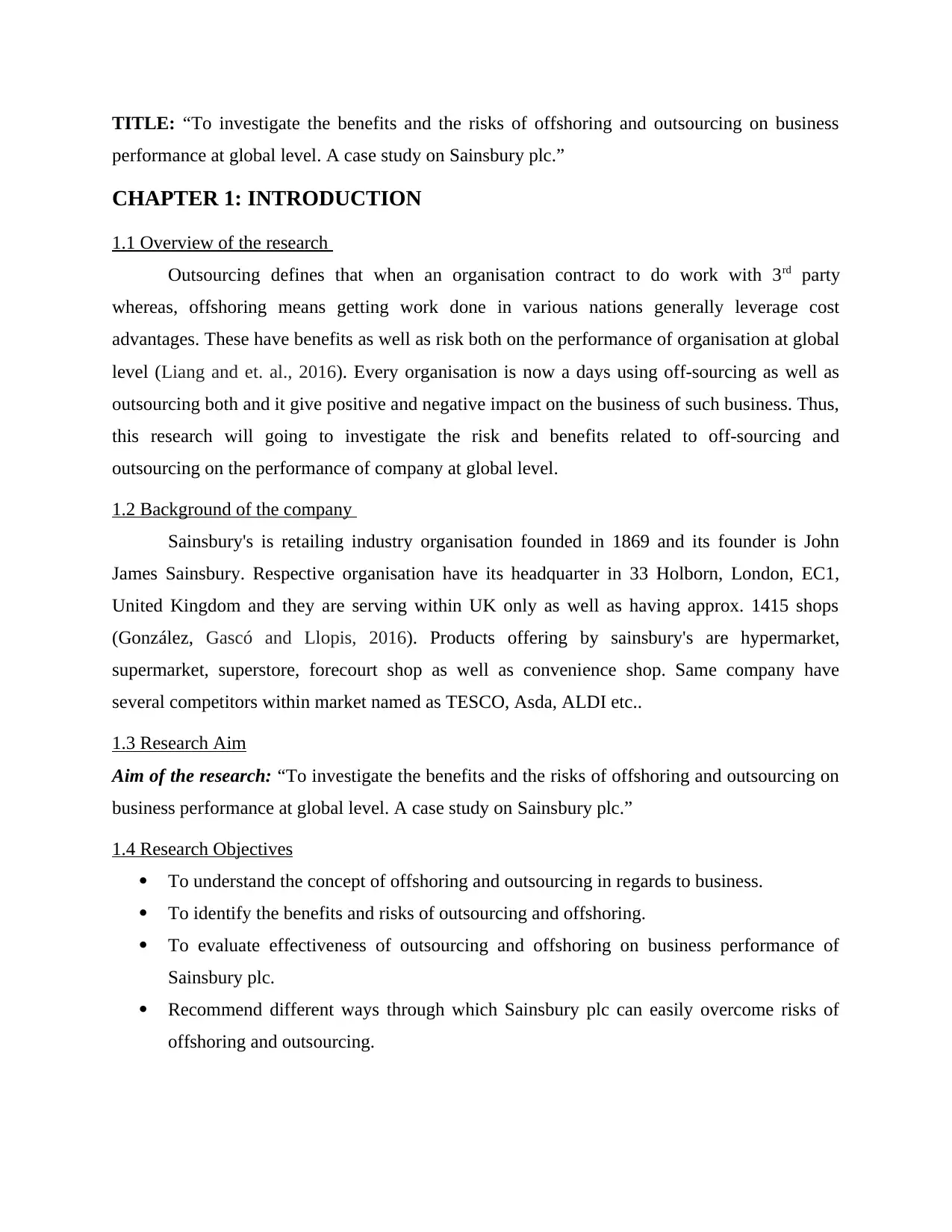
TITLE: “To investigate the benefits and the risks of offshoring and outsourcing on business
performance at global level. A case study on Sainsbury plc.”
CHAPTER 1: INTRODUCTION
1.1 Overview of the research
Outsourcing defines that when an organisation contract to do work with 3rd party
whereas, offshoring means getting work done in various nations generally leverage cost
advantages. These have benefits as well as risk both on the performance of organisation at global
level (Liang and et. al., 2016). Every organisation is now a days using off-sourcing as well as
outsourcing both and it give positive and negative impact on the business of such business. Thus,
this research will going to investigate the risk and benefits related to off-sourcing and
outsourcing on the performance of company at global level.
1.2 Background of the company
Sainsbury's is retailing industry organisation founded in 1869 and its founder is John
James Sainsbury. Respective organisation have its headquarter in 33 Holborn, London, EC1,
United Kingdom and they are serving within UK only as well as having approx. 1415 shops
(González, Gascó and Llopis, 2016). Products offering by sainsbury's are hypermarket,
supermarket, superstore, forecourt shop as well as convenience shop. Same company have
several competitors within market named as TESCO, Asda, ALDI etc..
1.3 Research Aim
Aim of the research: “To investigate the benefits and the risks of offshoring and outsourcing on
business performance at global level. A case study on Sainsbury plc.”
1.4 Research Objectives
To understand the concept of offshoring and outsourcing in regards to business.
To identify the benefits and risks of outsourcing and offshoring.
To evaluate effectiveness of outsourcing and offshoring on business performance of
Sainsbury plc.
Recommend different ways through which Sainsbury plc can easily overcome risks of
offshoring and outsourcing.
performance at global level. A case study on Sainsbury plc.”
CHAPTER 1: INTRODUCTION
1.1 Overview of the research
Outsourcing defines that when an organisation contract to do work with 3rd party
whereas, offshoring means getting work done in various nations generally leverage cost
advantages. These have benefits as well as risk both on the performance of organisation at global
level (Liang and et. al., 2016). Every organisation is now a days using off-sourcing as well as
outsourcing both and it give positive and negative impact on the business of such business. Thus,
this research will going to investigate the risk and benefits related to off-sourcing and
outsourcing on the performance of company at global level.
1.2 Background of the company
Sainsbury's is retailing industry organisation founded in 1869 and its founder is John
James Sainsbury. Respective organisation have its headquarter in 33 Holborn, London, EC1,
United Kingdom and they are serving within UK only as well as having approx. 1415 shops
(González, Gascó and Llopis, 2016). Products offering by sainsbury's are hypermarket,
supermarket, superstore, forecourt shop as well as convenience shop. Same company have
several competitors within market named as TESCO, Asda, ALDI etc..
1.3 Research Aim
Aim of the research: “To investigate the benefits and the risks of offshoring and outsourcing on
business performance at global level. A case study on Sainsbury plc.”
1.4 Research Objectives
To understand the concept of offshoring and outsourcing in regards to business.
To identify the benefits and risks of outsourcing and offshoring.
To evaluate effectiveness of outsourcing and offshoring on business performance of
Sainsbury plc.
Recommend different ways through which Sainsbury plc can easily overcome risks of
offshoring and outsourcing.
⊘ This is a preview!⊘
Do you want full access?
Subscribe today to unlock all pages.

Trusted by 1+ million students worldwide
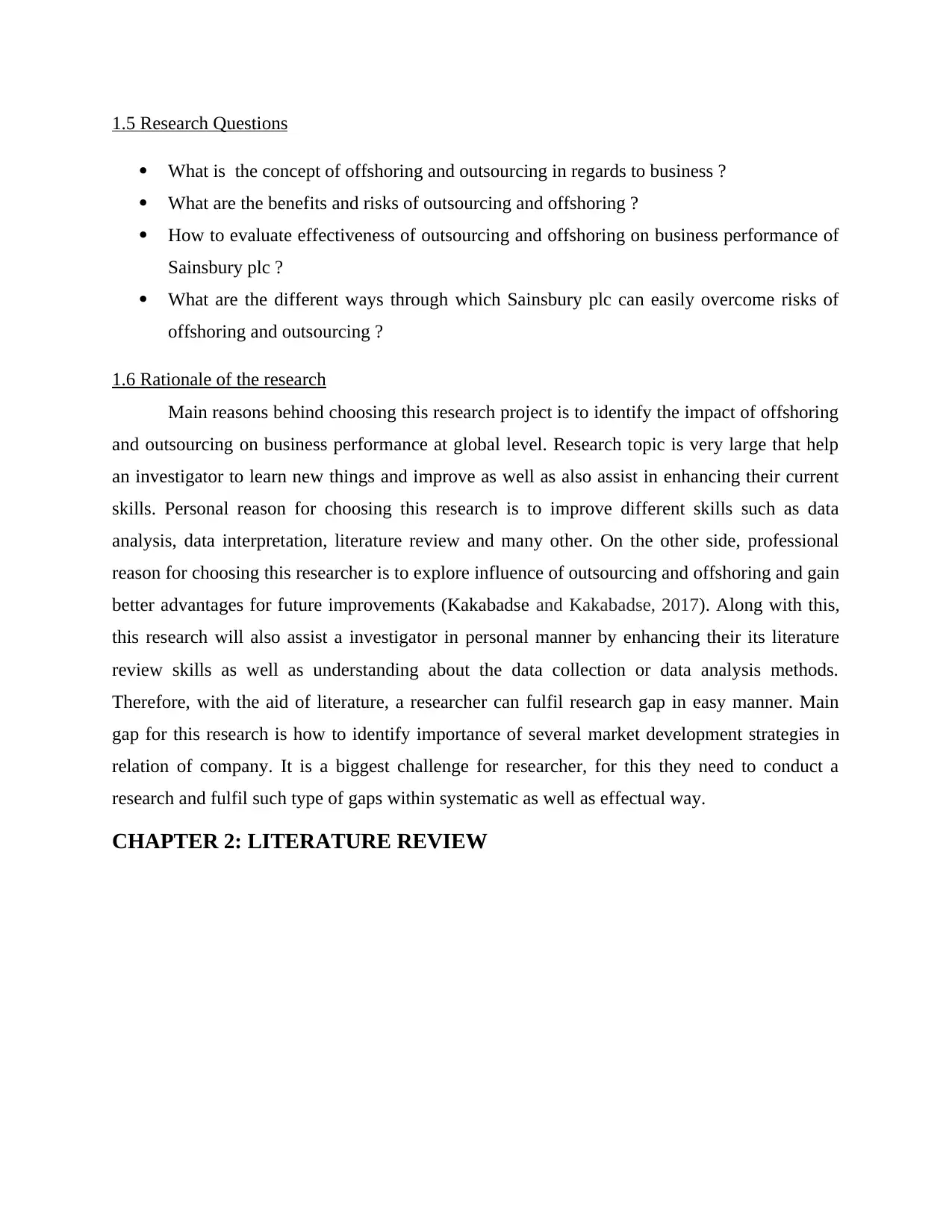
1.5 Research Questions
What is the concept of offshoring and outsourcing in regards to business ?
What are the benefits and risks of outsourcing and offshoring ?
How to evaluate effectiveness of outsourcing and offshoring on business performance of
Sainsbury plc ?
What are the different ways through which Sainsbury plc can easily overcome risks of
offshoring and outsourcing ?
1.6 Rationale of the research
Main reasons behind choosing this research project is to identify the impact of offshoring
and outsourcing on business performance at global level. Research topic is very large that help
an investigator to learn new things and improve as well as also assist in enhancing their current
skills. Personal reason for choosing this research is to improve different skills such as data
analysis, data interpretation, literature review and many other. On the other side, professional
reason for choosing this researcher is to explore influence of outsourcing and offshoring and gain
better advantages for future improvements (Kakabadse and Kakabadse, 2017). Along with this,
this research will also assist a investigator in personal manner by enhancing their its literature
review skills as well as understanding about the data collection or data analysis methods.
Therefore, with the aid of literature, a researcher can fulfil research gap in easy manner. Main
gap for this research is how to identify importance of several market development strategies in
relation of company. It is a biggest challenge for researcher, for this they need to conduct a
research and fulfil such type of gaps within systematic as well as effectual way.
CHAPTER 2: LITERATURE REVIEW
What is the concept of offshoring and outsourcing in regards to business ?
What are the benefits and risks of outsourcing and offshoring ?
How to evaluate effectiveness of outsourcing and offshoring on business performance of
Sainsbury plc ?
What are the different ways through which Sainsbury plc can easily overcome risks of
offshoring and outsourcing ?
1.6 Rationale of the research
Main reasons behind choosing this research project is to identify the impact of offshoring
and outsourcing on business performance at global level. Research topic is very large that help
an investigator to learn new things and improve as well as also assist in enhancing their current
skills. Personal reason for choosing this research is to improve different skills such as data
analysis, data interpretation, literature review and many other. On the other side, professional
reason for choosing this researcher is to explore influence of outsourcing and offshoring and gain
better advantages for future improvements (Kakabadse and Kakabadse, 2017). Along with this,
this research will also assist a investigator in personal manner by enhancing their its literature
review skills as well as understanding about the data collection or data analysis methods.
Therefore, with the aid of literature, a researcher can fulfil research gap in easy manner. Main
gap for this research is how to identify importance of several market development strategies in
relation of company. It is a biggest challenge for researcher, for this they need to conduct a
research and fulfil such type of gaps within systematic as well as effectual way.
CHAPTER 2: LITERATURE REVIEW
Paraphrase This Document
Need a fresh take? Get an instant paraphrase of this document with our AI Paraphraser
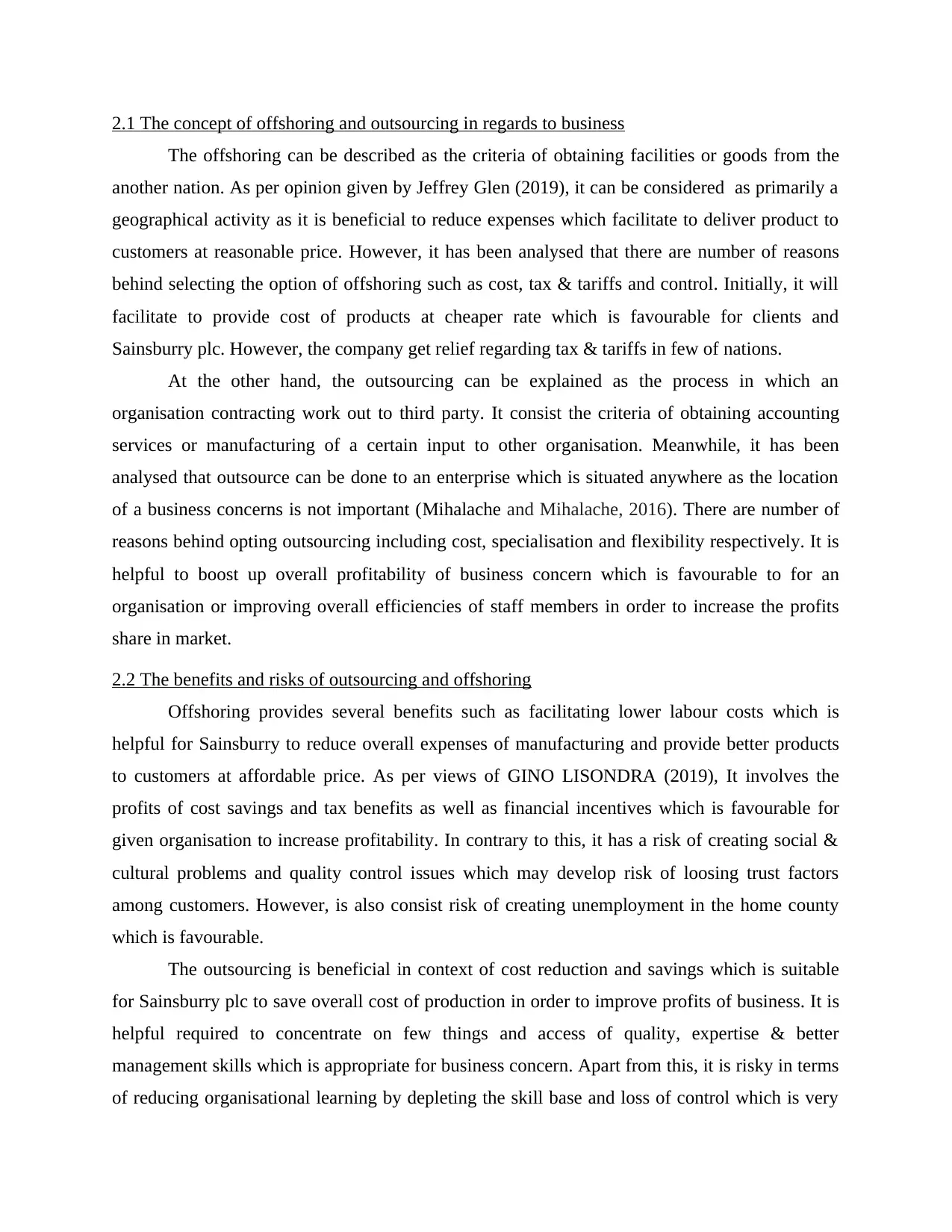
2.1 The concept of offshoring and outsourcing in regards to business
The offshoring can be described as the criteria of obtaining facilities or goods from the
another nation. As per opinion given by Jeffrey Glen (2019), it can be considered as primarily a
geographical activity as it is beneficial to reduce expenses which facilitate to deliver product to
customers at reasonable price. However, it has been analysed that there are number of reasons
behind selecting the option of offshoring such as cost, tax & tariffs and control. Initially, it will
facilitate to provide cost of products at cheaper rate which is favourable for clients and
Sainsburry plc. However, the company get relief regarding tax & tariffs in few of nations.
At the other hand, the outsourcing can be explained as the process in which an
organisation contracting work out to third party. It consist the criteria of obtaining accounting
services or manufacturing of a certain input to other organisation. Meanwhile, it has been
analysed that outsource can be done to an enterprise which is situated anywhere as the location
of a business concerns is not important (Mihalache and Mihalache, 2016). There are number of
reasons behind opting outsourcing including cost, specialisation and flexibility respectively. It is
helpful to boost up overall profitability of business concern which is favourable to for an
organisation or improving overall efficiencies of staff members in order to increase the profits
share in market.
2.2 The benefits and risks of outsourcing and offshoring
Offshoring provides several benefits such as facilitating lower labour costs which is
helpful for Sainsburry to reduce overall expenses of manufacturing and provide better products
to customers at affordable price. As per views of GINO LISONDRA (2019), It involves the
profits of cost savings and tax benefits as well as financial incentives which is favourable for
given organisation to increase profitability. In contrary to this, it has a risk of creating social &
cultural problems and quality control issues which may develop risk of loosing trust factors
among customers. However, is also consist risk of creating unemployment in the home county
which is favourable.
The outsourcing is beneficial in context of cost reduction and savings which is suitable
for Sainsburry plc to save overall cost of production in order to improve profits of business. It is
helpful required to concentrate on few things and access of quality, expertise & better
management skills which is appropriate for business concern. Apart from this, it is risky in terms
of reducing organisational learning by depleting the skill base and loss of control which is very
The offshoring can be described as the criteria of obtaining facilities or goods from the
another nation. As per opinion given by Jeffrey Glen (2019), it can be considered as primarily a
geographical activity as it is beneficial to reduce expenses which facilitate to deliver product to
customers at reasonable price. However, it has been analysed that there are number of reasons
behind selecting the option of offshoring such as cost, tax & tariffs and control. Initially, it will
facilitate to provide cost of products at cheaper rate which is favourable for clients and
Sainsburry plc. However, the company get relief regarding tax & tariffs in few of nations.
At the other hand, the outsourcing can be explained as the process in which an
organisation contracting work out to third party. It consist the criteria of obtaining accounting
services or manufacturing of a certain input to other organisation. Meanwhile, it has been
analysed that outsource can be done to an enterprise which is situated anywhere as the location
of a business concerns is not important (Mihalache and Mihalache, 2016). There are number of
reasons behind opting outsourcing including cost, specialisation and flexibility respectively. It is
helpful to boost up overall profitability of business concern which is favourable to for an
organisation or improving overall efficiencies of staff members in order to increase the profits
share in market.
2.2 The benefits and risks of outsourcing and offshoring
Offshoring provides several benefits such as facilitating lower labour costs which is
helpful for Sainsburry to reduce overall expenses of manufacturing and provide better products
to customers at affordable price. As per views of GINO LISONDRA (2019), It involves the
profits of cost savings and tax benefits as well as financial incentives which is favourable for
given organisation to increase profitability. In contrary to this, it has a risk of creating social &
cultural problems and quality control issues which may develop risk of loosing trust factors
among customers. However, is also consist risk of creating unemployment in the home county
which is favourable.
The outsourcing is beneficial in context of cost reduction and savings which is suitable
for Sainsburry plc to save overall cost of production in order to improve profits of business. It is
helpful required to concentrate on few things and access of quality, expertise & better
management skills which is appropriate for business concern. Apart from this, it is risky in terms
of reducing organisational learning by depleting the skill base and loss of control which is very
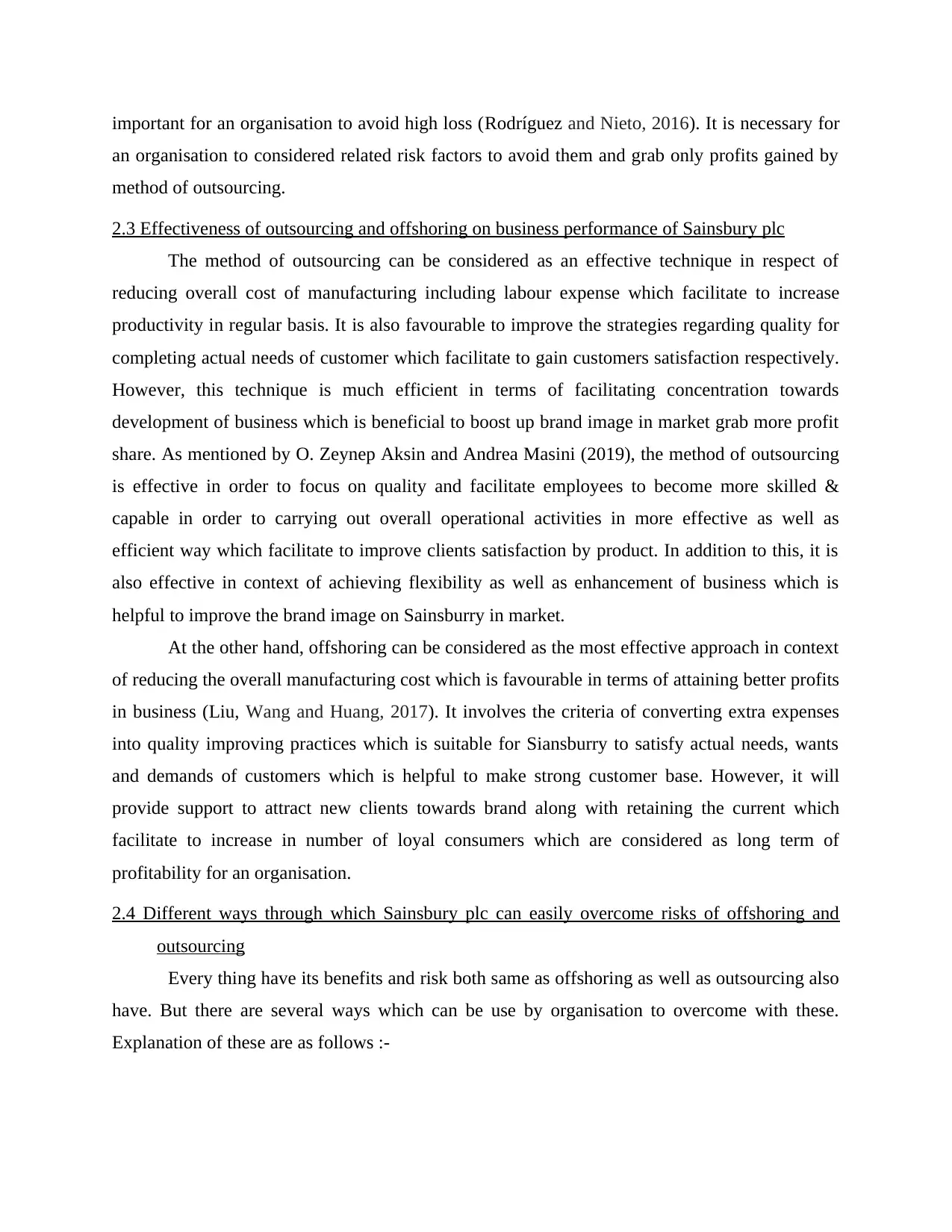
important for an organisation to avoid high loss (Rodríguez and Nieto, 2016). It is necessary for
an organisation to considered related risk factors to avoid them and grab only profits gained by
method of outsourcing.
2.3 Effectiveness of outsourcing and offshoring on business performance of Sainsbury plc
The method of outsourcing can be considered as an effective technique in respect of
reducing overall cost of manufacturing including labour expense which facilitate to increase
productivity in regular basis. It is also favourable to improve the strategies regarding quality for
completing actual needs of customer which facilitate to gain customers satisfaction respectively.
However, this technique is much efficient in terms of facilitating concentration towards
development of business which is beneficial to boost up brand image in market grab more profit
share. As mentioned by O. Zeynep Aksin and Andrea Masini (2019), the method of outsourcing
is effective in order to focus on quality and facilitate employees to become more skilled &
capable in order to carrying out overall operational activities in more effective as well as
efficient way which facilitate to improve clients satisfaction by product. In addition to this, it is
also effective in context of achieving flexibility as well as enhancement of business which is
helpful to improve the brand image on Sainsburry in market.
At the other hand, offshoring can be considered as the most effective approach in context
of reducing the overall manufacturing cost which is favourable in terms of attaining better profits
in business (Liu, Wang and Huang, 2017). It involves the criteria of converting extra expenses
into quality improving practices which is suitable for Siansburry to satisfy actual needs, wants
and demands of customers which is helpful to make strong customer base. However, it will
provide support to attract new clients towards brand along with retaining the current which
facilitate to increase in number of loyal consumers which are considered as long term of
profitability for an organisation.
2.4 Different ways through which Sainsbury plc can easily overcome risks of offshoring and
outsourcing
Every thing have its benefits and risk both same as offshoring as well as outsourcing also
have. But there are several ways which can be use by organisation to overcome with these.
Explanation of these are as follows :-
an organisation to considered related risk factors to avoid them and grab only profits gained by
method of outsourcing.
2.3 Effectiveness of outsourcing and offshoring on business performance of Sainsbury plc
The method of outsourcing can be considered as an effective technique in respect of
reducing overall cost of manufacturing including labour expense which facilitate to increase
productivity in regular basis. It is also favourable to improve the strategies regarding quality for
completing actual needs of customer which facilitate to gain customers satisfaction respectively.
However, this technique is much efficient in terms of facilitating concentration towards
development of business which is beneficial to boost up brand image in market grab more profit
share. As mentioned by O. Zeynep Aksin and Andrea Masini (2019), the method of outsourcing
is effective in order to focus on quality and facilitate employees to become more skilled &
capable in order to carrying out overall operational activities in more effective as well as
efficient way which facilitate to improve clients satisfaction by product. In addition to this, it is
also effective in context of achieving flexibility as well as enhancement of business which is
helpful to improve the brand image on Sainsburry in market.
At the other hand, offshoring can be considered as the most effective approach in context
of reducing the overall manufacturing cost which is favourable in terms of attaining better profits
in business (Liu, Wang and Huang, 2017). It involves the criteria of converting extra expenses
into quality improving practices which is suitable for Siansburry to satisfy actual needs, wants
and demands of customers which is helpful to make strong customer base. However, it will
provide support to attract new clients towards brand along with retaining the current which
facilitate to increase in number of loyal consumers which are considered as long term of
profitability for an organisation.
2.4 Different ways through which Sainsbury plc can easily overcome risks of offshoring and
outsourcing
Every thing have its benefits and risk both same as offshoring as well as outsourcing also
have. But there are several ways which can be use by organisation to overcome with these.
Explanation of these are as follows :-
⊘ This is a preview!⊘
Do you want full access?
Subscribe today to unlock all pages.

Trusted by 1+ million students worldwide
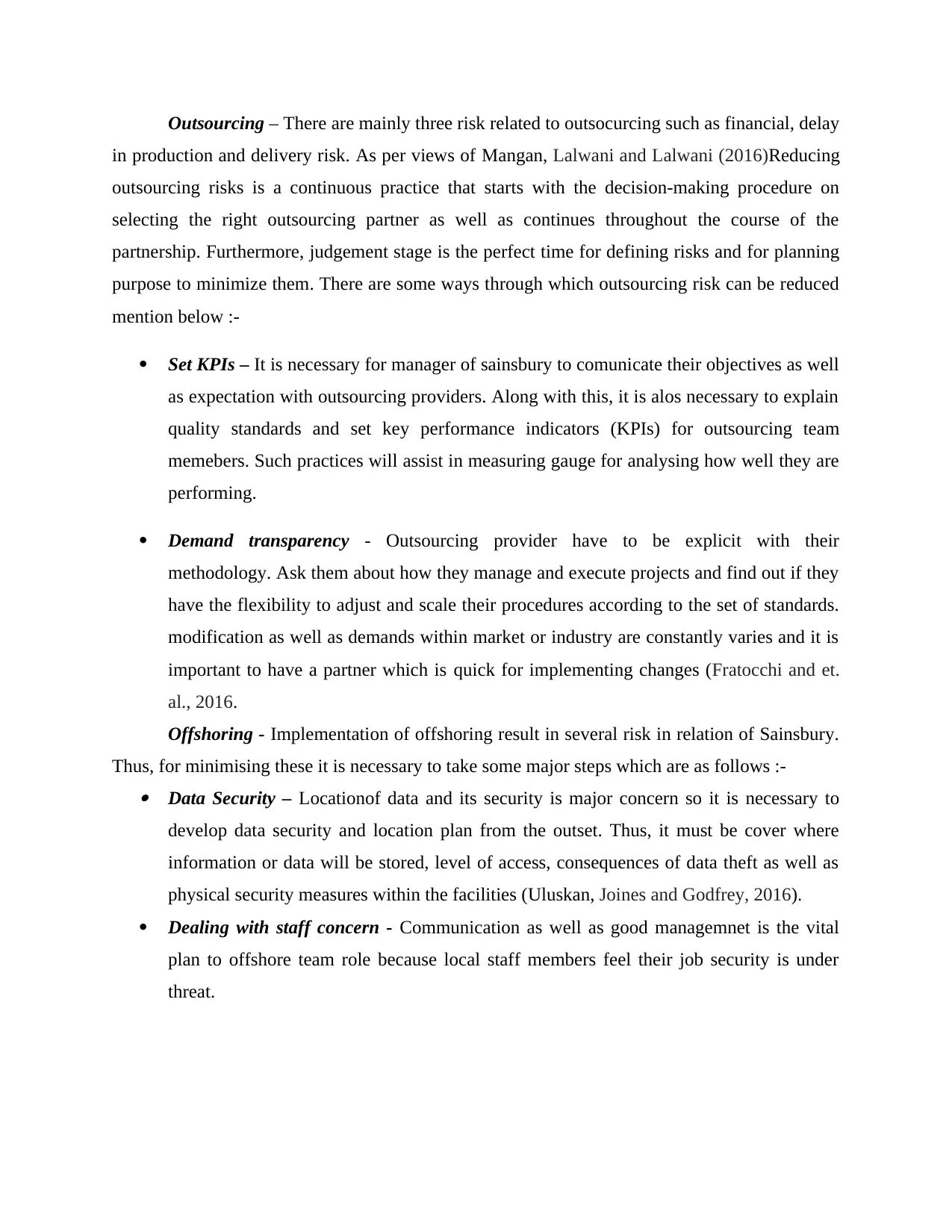
Outsourcing – There are mainly three risk related to outsocurcing such as financial, delay
in production and delivery risk. As per views of Mangan, Lalwani and Lalwani (2016)Reducing
outsourcing risks is a continuous practice that starts with the decision-making procedure on
selecting the right outsourcing partner as well as continues throughout the course of the
partnership. Furthermore, judgement stage is the perfect time for defining risks and for planning
purpose to minimize them. There are some ways through which outsourcing risk can be reduced
mention below :-
Set KPIs – It is necessary for manager of sainsbury to comunicate their objectives as well
as expectation with outsourcing providers. Along with this, it is alos necessary to explain
quality standards and set key performance indicators (KPIs) for outsourcing team
memebers. Such practices will assist in measuring gauge for analysing how well they are
performing.
Demand transparency - Outsourcing provider have to be explicit with their
methodology. Ask them about how they manage and execute projects and find out if they
have the flexibility to adjust and scale their procedures according to the set of standards.
modification as well as demands within market or industry are constantly varies and it is
important to have a partner which is quick for implementing changes (Fratocchi and et.
al., 2016.
Offshoring - Implementation of offshoring result in several risk in relation of Sainsbury.
Thus, for minimising these it is necessary to take some major steps which are as follows :- Data Security – Locationof data and its security is major concern so it is necessary to
develop data security and location plan from the outset. Thus, it must be cover where
information or data will be stored, level of access, consequences of data theft as well as
physical security measures within the facilities (Uluskan, Joines and Godfrey, 2016).
Dealing with staff concern - Communication as well as good managemnet is the vital
plan to offshore team role because local staff members feel their job security is under
threat.
in production and delivery risk. As per views of Mangan, Lalwani and Lalwani (2016)Reducing
outsourcing risks is a continuous practice that starts with the decision-making procedure on
selecting the right outsourcing partner as well as continues throughout the course of the
partnership. Furthermore, judgement stage is the perfect time for defining risks and for planning
purpose to minimize them. There are some ways through which outsourcing risk can be reduced
mention below :-
Set KPIs – It is necessary for manager of sainsbury to comunicate their objectives as well
as expectation with outsourcing providers. Along with this, it is alos necessary to explain
quality standards and set key performance indicators (KPIs) for outsourcing team
memebers. Such practices will assist in measuring gauge for analysing how well they are
performing.
Demand transparency - Outsourcing provider have to be explicit with their
methodology. Ask them about how they manage and execute projects and find out if they
have the flexibility to adjust and scale their procedures according to the set of standards.
modification as well as demands within market or industry are constantly varies and it is
important to have a partner which is quick for implementing changes (Fratocchi and et.
al., 2016.
Offshoring - Implementation of offshoring result in several risk in relation of Sainsbury.
Thus, for minimising these it is necessary to take some major steps which are as follows :- Data Security – Locationof data and its security is major concern so it is necessary to
develop data security and location plan from the outset. Thus, it must be cover where
information or data will be stored, level of access, consequences of data theft as well as
physical security measures within the facilities (Uluskan, Joines and Godfrey, 2016).
Dealing with staff concern - Communication as well as good managemnet is the vital
plan to offshore team role because local staff members feel their job security is under
threat.
Paraphrase This Document
Need a fresh take? Get an instant paraphrase of this document with our AI Paraphraser
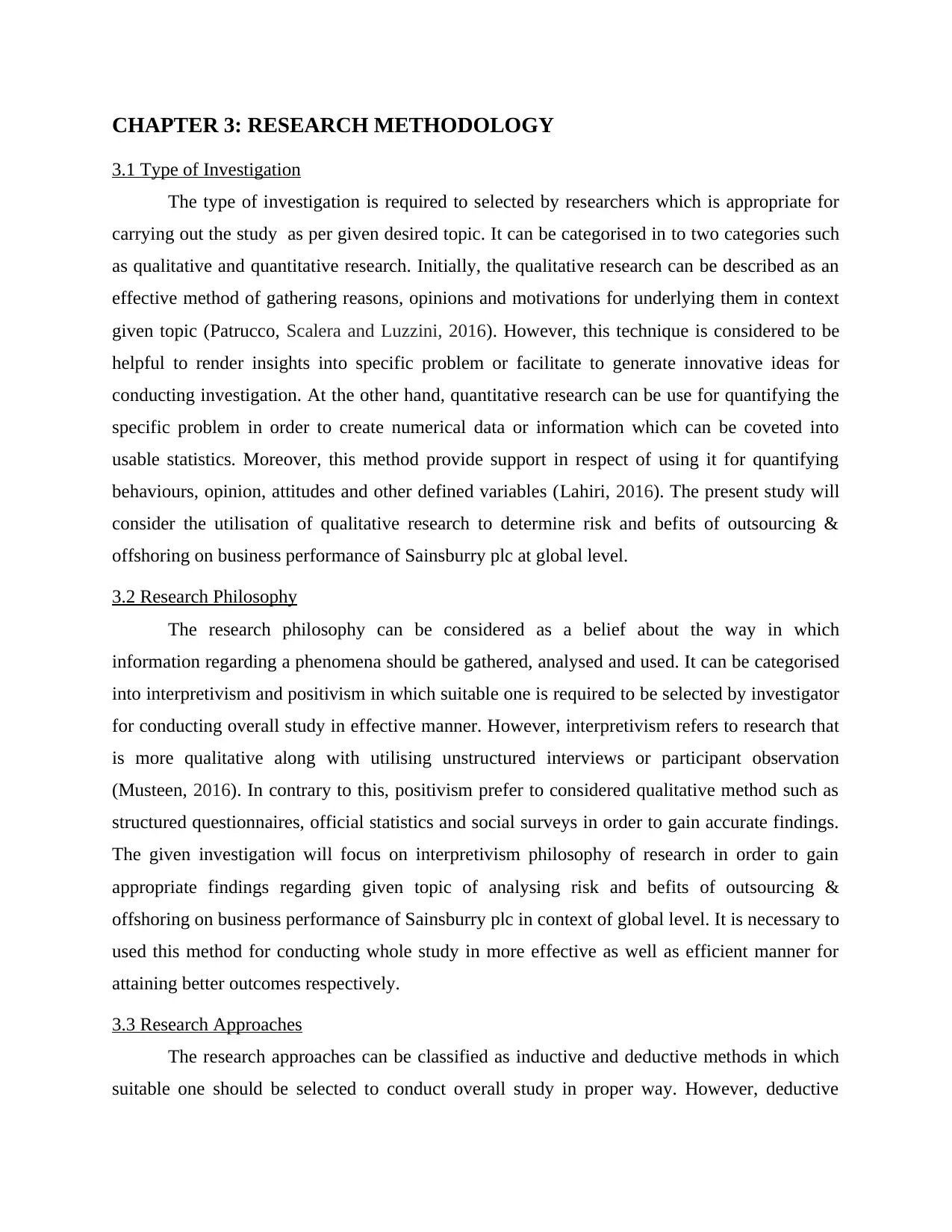
CHAPTER 3: RESEARCH METHODOLOGY
3.1 Type of Investigation
The type of investigation is required to selected by researchers which is appropriate for
carrying out the study as per given desired topic. It can be categorised in to two categories such
as qualitative and quantitative research. Initially, the qualitative research can be described as an
effective method of gathering reasons, opinions and motivations for underlying them in context
given topic (Patrucco, Scalera and Luzzini, 2016). However, this technique is considered to be
helpful to render insights into specific problem or facilitate to generate innovative ideas for
conducting investigation. At the other hand, quantitative research can be use for quantifying the
specific problem in order to create numerical data or information which can be coveted into
usable statistics. Moreover, this method provide support in respect of using it for quantifying
behaviours, opinion, attitudes and other defined variables (Lahiri, 2016). The present study will
consider the utilisation of qualitative research to determine risk and befits of outsourcing &
offshoring on business performance of Sainsburry plc at global level.
3.2 Research Philosophy
The research philosophy can be considered as a belief about the way in which
information regarding a phenomena should be gathered, analysed and used. It can be categorised
into interpretivism and positivism in which suitable one is required to be selected by investigator
for conducting overall study in effective manner. However, interpretivism refers to research that
is more qualitative along with utilising unstructured interviews or participant observation
(Musteen, 2016). In contrary to this, positivism prefer to considered qualitative method such as
structured questionnaires, official statistics and social surveys in order to gain accurate findings.
The given investigation will focus on interpretivism philosophy of research in order to gain
appropriate findings regarding given topic of analysing risk and befits of outsourcing &
offshoring on business performance of Sainsburry plc in context of global level. It is necessary to
used this method for conducting whole study in more effective as well as efficient manner for
attaining better outcomes respectively.
3.3 Research Approaches
The research approaches can be classified as inductive and deductive methods in which
suitable one should be selected to conduct overall study in proper way. However, deductive
3.1 Type of Investigation
The type of investigation is required to selected by researchers which is appropriate for
carrying out the study as per given desired topic. It can be categorised in to two categories such
as qualitative and quantitative research. Initially, the qualitative research can be described as an
effective method of gathering reasons, opinions and motivations for underlying them in context
given topic (Patrucco, Scalera and Luzzini, 2016). However, this technique is considered to be
helpful to render insights into specific problem or facilitate to generate innovative ideas for
conducting investigation. At the other hand, quantitative research can be use for quantifying the
specific problem in order to create numerical data or information which can be coveted into
usable statistics. Moreover, this method provide support in respect of using it for quantifying
behaviours, opinion, attitudes and other defined variables (Lahiri, 2016). The present study will
consider the utilisation of qualitative research to determine risk and befits of outsourcing &
offshoring on business performance of Sainsburry plc at global level.
3.2 Research Philosophy
The research philosophy can be considered as a belief about the way in which
information regarding a phenomena should be gathered, analysed and used. It can be categorised
into interpretivism and positivism in which suitable one is required to be selected by investigator
for conducting overall study in effective manner. However, interpretivism refers to research that
is more qualitative along with utilising unstructured interviews or participant observation
(Musteen, 2016). In contrary to this, positivism prefer to considered qualitative method such as
structured questionnaires, official statistics and social surveys in order to gain accurate findings.
The given investigation will focus on interpretivism philosophy of research in order to gain
appropriate findings regarding given topic of analysing risk and befits of outsourcing &
offshoring on business performance of Sainsburry plc in context of global level. It is necessary to
used this method for conducting whole study in more effective as well as efficient manner for
attaining better outcomes respectively.
3.3 Research Approaches
The research approaches can be classified as inductive and deductive methods in which
suitable one should be selected to conduct overall study in proper way. However, deductive
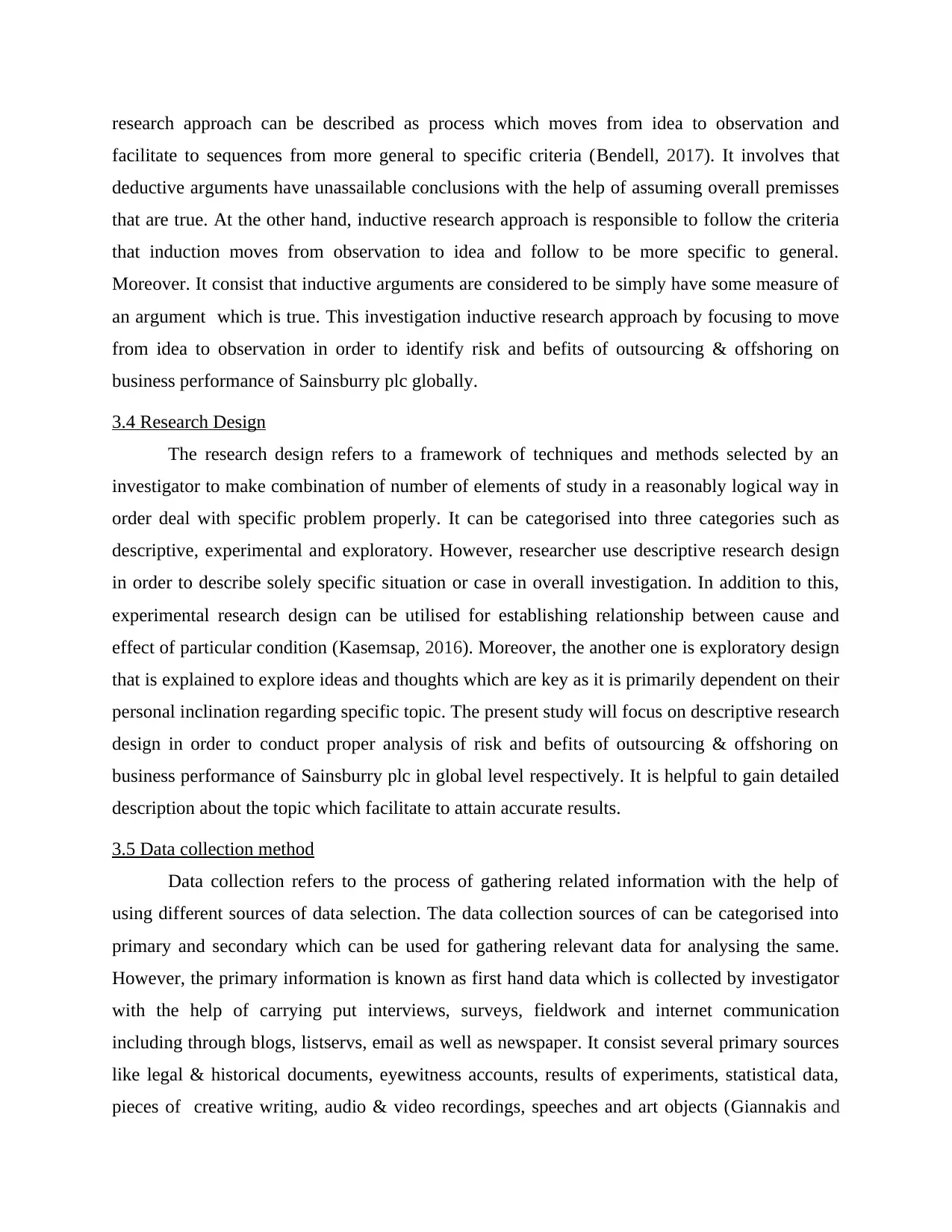
research approach can be described as process which moves from idea to observation and
facilitate to sequences from more general to specific criteria (Bendell, 2017). It involves that
deductive arguments have unassailable conclusions with the help of assuming overall premisses
that are true. At the other hand, inductive research approach is responsible to follow the criteria
that induction moves from observation to idea and follow to be more specific to general.
Moreover. It consist that inductive arguments are considered to be simply have some measure of
an argument which is true. This investigation inductive research approach by focusing to move
from idea to observation in order to identify risk and befits of outsourcing & offshoring on
business performance of Sainsburry plc globally.
3.4 Research Design
The research design refers to a framework of techniques and methods selected by an
investigator to make combination of number of elements of study in a reasonably logical way in
order deal with specific problem properly. It can be categorised into three categories such as
descriptive, experimental and exploratory. However, researcher use descriptive research design
in order to describe solely specific situation or case in overall investigation. In addition to this,
experimental research design can be utilised for establishing relationship between cause and
effect of particular condition (Kasemsap, 2016). Moreover, the another one is exploratory design
that is explained to explore ideas and thoughts which are key as it is primarily dependent on their
personal inclination regarding specific topic. The present study will focus on descriptive research
design in order to conduct proper analysis of risk and befits of outsourcing & offshoring on
business performance of Sainsburry plc in global level respectively. It is helpful to gain detailed
description about the topic which facilitate to attain accurate results.
3.5 Data collection method
Data collection refers to the process of gathering related information with the help of
using different sources of data selection. The data collection sources of can be categorised into
primary and secondary which can be used for gathering relevant data for analysing the same.
However, the primary information is known as first hand data which is collected by investigator
with the help of carrying put interviews, surveys, fieldwork and internet communication
including through blogs, listservs, email as well as newspaper. It consist several primary sources
like legal & historical documents, eyewitness accounts, results of experiments, statistical data,
pieces of creative writing, audio & video recordings, speeches and art objects (Giannakis and
facilitate to sequences from more general to specific criteria (Bendell, 2017). It involves that
deductive arguments have unassailable conclusions with the help of assuming overall premisses
that are true. At the other hand, inductive research approach is responsible to follow the criteria
that induction moves from observation to idea and follow to be more specific to general.
Moreover. It consist that inductive arguments are considered to be simply have some measure of
an argument which is true. This investigation inductive research approach by focusing to move
from idea to observation in order to identify risk and befits of outsourcing & offshoring on
business performance of Sainsburry plc globally.
3.4 Research Design
The research design refers to a framework of techniques and methods selected by an
investigator to make combination of number of elements of study in a reasonably logical way in
order deal with specific problem properly. It can be categorised into three categories such as
descriptive, experimental and exploratory. However, researcher use descriptive research design
in order to describe solely specific situation or case in overall investigation. In addition to this,
experimental research design can be utilised for establishing relationship between cause and
effect of particular condition (Kasemsap, 2016). Moreover, the another one is exploratory design
that is explained to explore ideas and thoughts which are key as it is primarily dependent on their
personal inclination regarding specific topic. The present study will focus on descriptive research
design in order to conduct proper analysis of risk and befits of outsourcing & offshoring on
business performance of Sainsburry plc in global level respectively. It is helpful to gain detailed
description about the topic which facilitate to attain accurate results.
3.5 Data collection method
Data collection refers to the process of gathering related information with the help of
using different sources of data selection. The data collection sources of can be categorised into
primary and secondary which can be used for gathering relevant data for analysing the same.
However, the primary information is known as first hand data which is collected by investigator
with the help of carrying put interviews, surveys, fieldwork and internet communication
including through blogs, listservs, email as well as newspaper. It consist several primary sources
like legal & historical documents, eyewitness accounts, results of experiments, statistical data,
pieces of creative writing, audio & video recordings, speeches and art objects (Giannakis and
⊘ This is a preview!⊘
Do you want full access?
Subscribe today to unlock all pages.

Trusted by 1+ million students worldwide
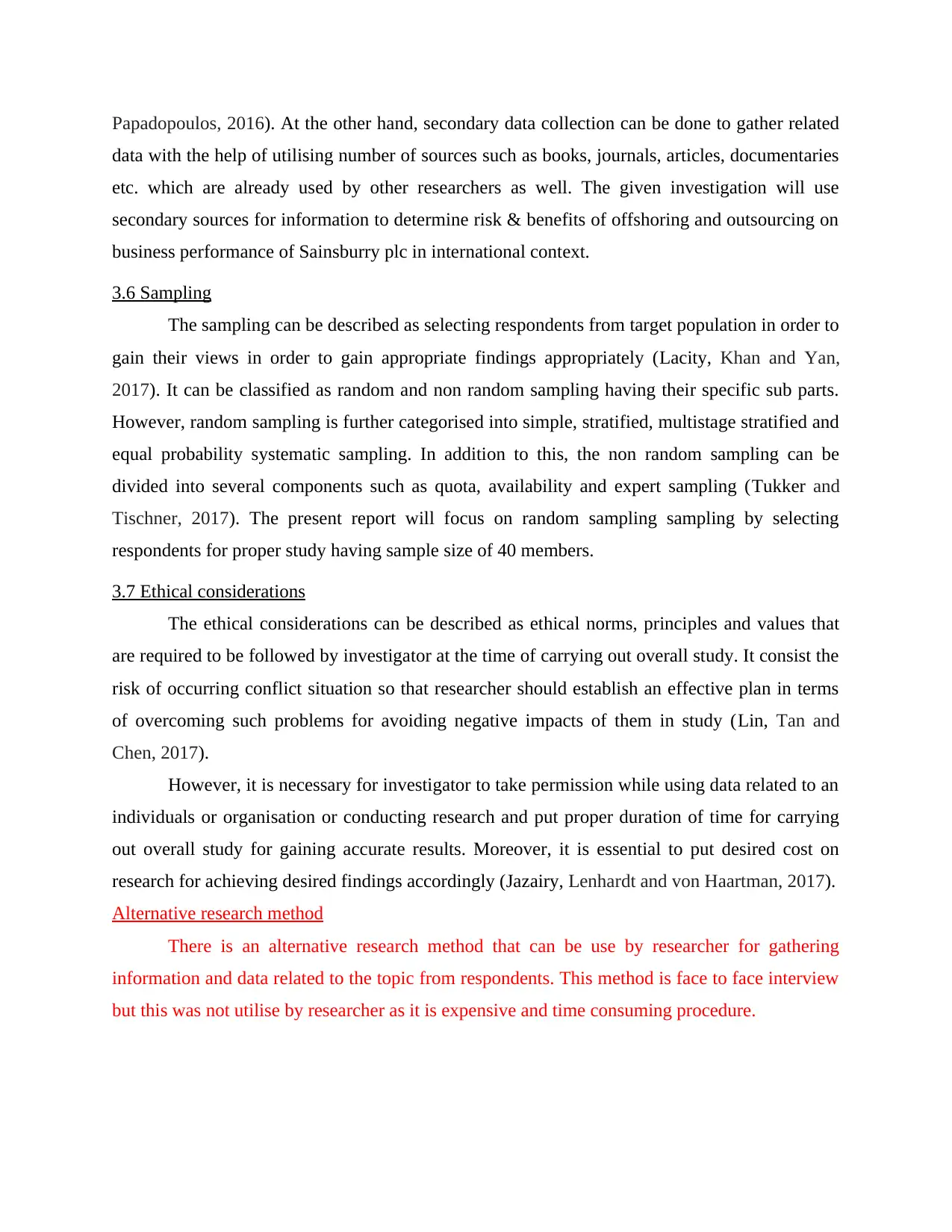
Papadopoulos, 2016). At the other hand, secondary data collection can be done to gather related
data with the help of utilising number of sources such as books, journals, articles, documentaries
etc. which are already used by other researchers as well. The given investigation will use
secondary sources for information to determine risk & benefits of offshoring and outsourcing on
business performance of Sainsburry plc in international context.
3.6 Sampling
The sampling can be described as selecting respondents from target population in order to
gain their views in order to gain appropriate findings appropriately (Lacity, Khan and Yan,
2017). It can be classified as random and non random sampling having their specific sub parts.
However, random sampling is further categorised into simple, stratified, multistage stratified and
equal probability systematic sampling. In addition to this, the non random sampling can be
divided into several components such as quota, availability and expert sampling (Tukker and
Tischner, 2017). The present report will focus on random sampling sampling by selecting
respondents for proper study having sample size of 40 members.
3.7 Ethical considerations
The ethical considerations can be described as ethical norms, principles and values that
are required to be followed by investigator at the time of carrying out overall study. It consist the
risk of occurring conflict situation so that researcher should establish an effective plan in terms
of overcoming such problems for avoiding negative impacts of them in study (Lin, Tan and
Chen, 2017).
However, it is necessary for investigator to take permission while using data related to an
individuals or organisation or conducting research and put proper duration of time for carrying
out overall study for gaining accurate results. Moreover, it is essential to put desired cost on
research for achieving desired findings accordingly (Jazairy, Lenhardt and von Haartman, 2017).
Alternative research method
There is an alternative research method that can be use by researcher for gathering
information and data related to the topic from respondents. This method is face to face interview
but this was not utilise by researcher as it is expensive and time consuming procedure.
data with the help of utilising number of sources such as books, journals, articles, documentaries
etc. which are already used by other researchers as well. The given investigation will use
secondary sources for information to determine risk & benefits of offshoring and outsourcing on
business performance of Sainsburry plc in international context.
3.6 Sampling
The sampling can be described as selecting respondents from target population in order to
gain their views in order to gain appropriate findings appropriately (Lacity, Khan and Yan,
2017). It can be classified as random and non random sampling having their specific sub parts.
However, random sampling is further categorised into simple, stratified, multistage stratified and
equal probability systematic sampling. In addition to this, the non random sampling can be
divided into several components such as quota, availability and expert sampling (Tukker and
Tischner, 2017). The present report will focus on random sampling sampling by selecting
respondents for proper study having sample size of 40 members.
3.7 Ethical considerations
The ethical considerations can be described as ethical norms, principles and values that
are required to be followed by investigator at the time of carrying out overall study. It consist the
risk of occurring conflict situation so that researcher should establish an effective plan in terms
of overcoming such problems for avoiding negative impacts of them in study (Lin, Tan and
Chen, 2017).
However, it is necessary for investigator to take permission while using data related to an
individuals or organisation or conducting research and put proper duration of time for carrying
out overall study for gaining accurate results. Moreover, it is essential to put desired cost on
research for achieving desired findings accordingly (Jazairy, Lenhardt and von Haartman, 2017).
Alternative research method
There is an alternative research method that can be use by researcher for gathering
information and data related to the topic from respondents. This method is face to face interview
but this was not utilise by researcher as it is expensive and time consuming procedure.
Paraphrase This Document
Need a fresh take? Get an instant paraphrase of this document with our AI Paraphraser

CHAPTER 4: DATA ANALYSIS AND INTERPRETATIONS
This questionnaire will be filled by variety of respondents like financial analysts, key
position holders in company, industry experts and few personnels of government authorities.
This questionnaire will be filled by variety of respondents like financial analysts, key
position holders in company, industry experts and few personnels of government authorities.
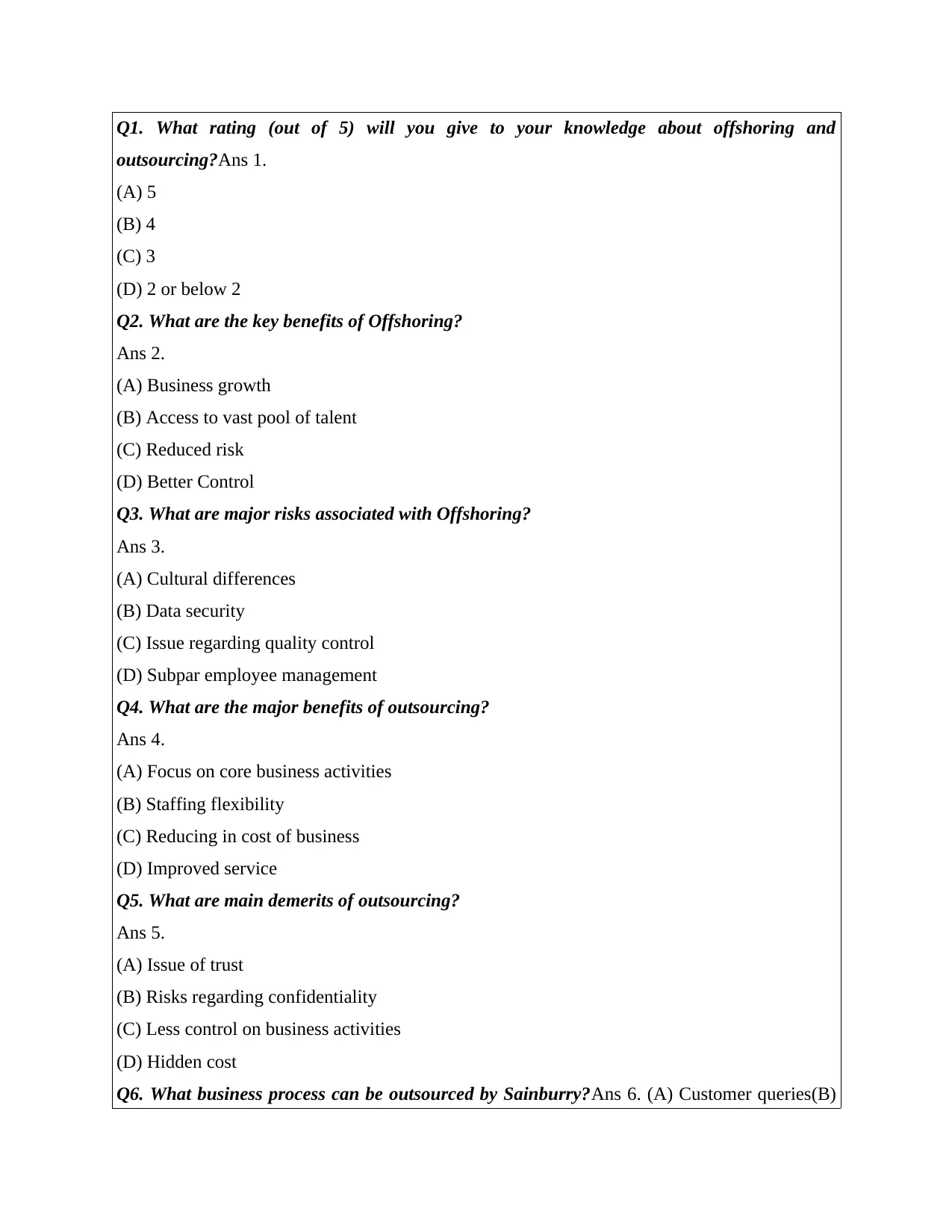
Q1. What rating (out of 5) will you give to your knowledge about offshoring and
outsourcing?Ans 1.
(A) 5
(B) 4
(C) 3
(D) 2 or below 2
Q2. What are the key benefits of Offshoring?
Ans 2.
(A) Business growth
(B) Access to vast pool of talent
(C) Reduced risk
(D) Better Control
Q3. What are major risks associated with Offshoring?
Ans 3.
(A) Cultural differences
(B) Data security
(C) Issue regarding quality control
(D) Subpar employee management
Q4. What are the major benefits of outsourcing?
Ans 4.
(A) Focus on core business activities
(B) Staffing flexibility
(C) Reducing in cost of business
(D) Improved service
Q5. What are main demerits of outsourcing?
Ans 5.
(A) Issue of trust
(B) Risks regarding confidentiality
(C) Less control on business activities
(D) Hidden cost
Q6. What business process can be outsourced by Sainburry?Ans 6. (A) Customer queries(B)
outsourcing?Ans 1.
(A) 5
(B) 4
(C) 3
(D) 2 or below 2
Q2. What are the key benefits of Offshoring?
Ans 2.
(A) Business growth
(B) Access to vast pool of talent
(C) Reduced risk
(D) Better Control
Q3. What are major risks associated with Offshoring?
Ans 3.
(A) Cultural differences
(B) Data security
(C) Issue regarding quality control
(D) Subpar employee management
Q4. What are the major benefits of outsourcing?
Ans 4.
(A) Focus on core business activities
(B) Staffing flexibility
(C) Reducing in cost of business
(D) Improved service
Q5. What are main demerits of outsourcing?
Ans 5.
(A) Issue of trust
(B) Risks regarding confidentiality
(C) Less control on business activities
(D) Hidden cost
Q6. What business process can be outsourced by Sainburry?Ans 6. (A) Customer queries(B)
⊘ This is a preview!⊘
Do you want full access?
Subscribe today to unlock all pages.

Trusted by 1+ million students worldwide
1 out of 27
Related Documents
Your All-in-One AI-Powered Toolkit for Academic Success.
+13062052269
info@desklib.com
Available 24*7 on WhatsApp / Email
![[object Object]](/_next/static/media/star-bottom.7253800d.svg)
Unlock your academic potential
Copyright © 2020–2026 A2Z Services. All Rights Reserved. Developed and managed by ZUCOL.





